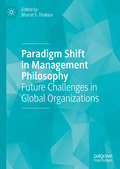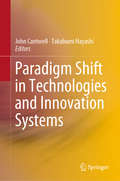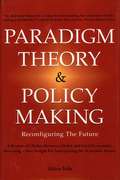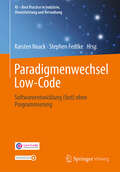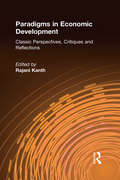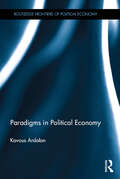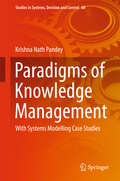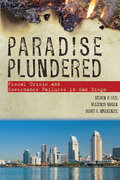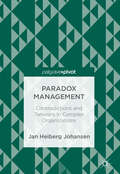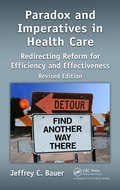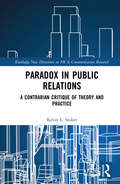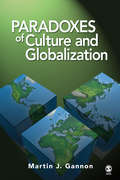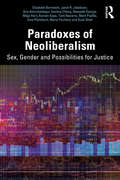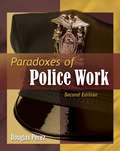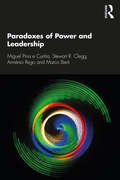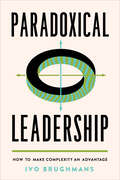- Table View
- List View
Paradigm Shift in Management Philosophy: Future Challenges in Global Organizations
by Bharat S. ThakkarRapidly growing technology and globalization have put tremendous pressure on management teams. Technological developments with far reaching implications on social, economic, political, and environmental ecosystems cannot be underemphasized. Currently, organizations are trying to be more inclusive and aware of diversity, rapid technology growth, and globalization along with remotely operating businesses for profit motivation. The delegative and individual employee-based management styles of the past have become obsolete. With globalization, virtual offices, and rapid technology growth, management challenges have become an expensive force to reckon with. In this book, the authors address the recent trends in management in global environments. The authors explore issues such as managing virtual teams, gender and management, e-commerce, biased financing, quantum computing, and disruption in the financial services industry. The book will serve as a valuable resource to researchers interested in the future management challenges facing global organizations.
Paradigm Shift in Technologies and Innovation Systems
by John Cantwell Takabumi HayashiThis book provides some new ideas on the conceptualization of a shift in technological paradigm, and it explores in depth the relevance of this concept for research on innovation systems. It examines text-mining software and analyzes patent data as well as academic and business journals to illustrate the paradigm shift of newly emerging technologies, such as the all-solid-state battery and automatic driving for electric vehicles, and surgical robots. It also explores the critical role of emerging software technologies by examining US, EU, and Japanese patent statistics.Highlighting the paradigm shift of technologies since the 1990s and the geographical dispersion of innovative capabilities, it identifies essential trends toward new innovation systems as well as the concentration and dispersion of national and corporate R&D capabilities that have taken place as a result.In this new paradigm, the competitiveness of a company is decisively determined by other innovations in systems and management. Since the 1990s, when a network economy began to be established and technological know-how came to be easily transferred across borders, the changing structure of technological activities has required organizations with traditional integral and closed architecture models to move toward open innovation or modular architectures. These changes involve wider technological areas and cognitive diversity among international inter-firm and intra-firm R&D networks.This book is highly recommended not only to academicians but also to business people seeking an in-depth and up-to-date overview of the paradigm shift of technologies and new innovation systems.
Paradigm Shift: The New Promise of Information Technology
by Don Tapscott Art CastonThe old, unresponsive bureaucracy simply doesn't work in today's volatile, open, global business environment. However, the computing systems in today's organization seem unable to deliver the goods for corporate rebirth.
Paradigm Shifts in Management Theory (Routledge Advances in Management and Business Studies)
by Łukasz Sułkowski Regina Lenart-GansiniecParadigm Shifts in Management Theory is an illuminating exploration of the evolving landscape of management science. This book goes beyond the surface, delving into profound insights and perspectives that redefine traditional paradigms.Through rigorous analysis and reflective narratives, each chapter unveils the transformative shifts shaping organizational leadership, offering a comprehensive understanding of key concepts and methodologies. From classical principles to emerging paradigms, elucidating the future of organizational leadership, readers will gain invaluable insights through empirical evidence and theoretical explorations, fostering a nuanced comprehension of practical applications. Advanced students, researchers, and practitioners will find that this book equips readers with essential knowledge to navigate the complexities of modern management science, fostering critical thinking and innovative approaches in real-world scenarios. Practitioners in organizational leadership benefit from practical insights and innovative perspectives, enhancing strategic decision-making and competitive advantage. Additionally, policymakers and interdisciplinary scholars exploring social phenomena find value in the interdisciplinary exchange facilitated by paradigm shifts. Embracing these shifts is crucial for advancing management science, ensuring its relevance and effectiveness in addressing contemporary challenges.Catering to a diverse audience within academia and professional settings, it serves students and researchers in management studies, offering a robust foundation in theoretical frameworks and research methodologies.
Paradigm Theory & Policy Making
by Akira Iida"An alternative framework of ideas for understanding the complexity of policy making in the fast lane." --John H. McArthur, Dean Emeritus, Harvard Business School.A review of clashes between global and local economics, reveals a new insight for anticipating the economic future.Paradigm Theory and Policy Making is a wide-ranging and thought-provoking treatise on the forces that have shaped the political economies of the developed and developing world since World War II. The author--a vastly experienced policy maker, nationally and internationally—takes us on a journey that encompasses not just economics but political science, sociology, philosophy and cultural studies as he presents an alternative framework to conventional academic ideas.Along the way, he provides a critical evaluation of theories that have dominated economic thought in the last 50 years and highlights the dangers of a blanket application of such theories without taking into account the "real-world" practicalities confronted by nation states in a globalizing world.Topics include: The Conceptual Framework of the Paradigm Theory Civilization, Culture and the Paradigm of Political Economy American Values and the Paradigm of Political Economy The Post-Terror Paradigm Developing Economies and the Paradigm of Political Economy A reflection on "Innocence and Design"
Paradigm Theory & Policy Making
by Akira Iida"An alternative framework of ideas for understanding the complexity of policy making in the fast lane." --John H. McArthur, Dean Emeritus, Harvard Business School.A review of clashes between global and local economics, reveals a new insight for anticipating the economic future.Paradigm Theory and Policy Making is a wide-ranging and thought-provoking treatise on the forces that have shaped the political economies of the developed and developing world since World War II. The author--a vastly experienced policy maker, nationally and internationally—takes us on a journey that encompasses not just economics but political science, sociology, philosophy and cultural studies as he presents an alternative framework to conventional academic ideas.Along the way, he provides a critical evaluation of theories that have dominated economic thought in the last 50 years and highlights the dangers of a blanket application of such theories without taking into account the "real-world" practicalities confronted by nation states in a globalizing world.Topics include: The Conceptual Framework of the Paradigm Theory Civilization, Culture and the Paradigm of Political Economy American Values and the Paradigm of Political Economy The Post-Terror Paradigm Developing Economies and the Paradigm of Political Economy A reflection on "Innocence and Design"
Paradigma der digitalen und multioptionalen Bildung: Ein sozio-ökonomisches Konstrukt der Belastungs-Beanspruchungs-Interiorisation des familien- und berufsbegleitenden Weiterbildungsstudiums (Schriften der Kalaidos Hochschule)
by Maika LangeIn diesem Buch wird untersucht, wie die Digitale Multioptionale Bildung gestaltet werden muss, um innerhalb eines familien- und berufsbegleitenden Weiterbildungsprogramms akademische Erolge zu erzielen.Dabei werden sowohl die Studierenden als auch die Hochschule berücksichtigt. Digitale Multioptionale Bildung ist als eine ganzheitliche Bildung zu verstehen in einem familien- und berufsbegleitenden Weiterbildungsprogramm, mit Gestaltungsmöglichkeiten unter Berücksichtigung der eigenen individuellen Leistungsanforderungen. Digitale Bildung wird hierbei als technologiegestützter Prozess innerhalb dieser Arbeit verstanden. Es werden vier Handlungsfelder hervorgehoben. 1.) Ein Konstrukt und seine Dimensionen innerhalb der digitalen, multioptionalen Bildung definiert werden. 2.) Ein Konzept von Stress und Belastung in Bezug auf Digitale Multioptionale Bildung soll entwickelt werden. 3.) Bedürfnisse von Studierenden und Hochschulen im sozioökonomischen Konstrukt sind zu ermitteln. 4.) Handlungsempfehlungen zur Digitalen Multioptionalen Bildung werden abgeleitet, basierend auf der sozioökonomischen Betrachtung innerhalb des Belastungs- und Beanspruchungskonzeptes.
Paradigmenwechsel Low-Code: Softwareentwicklung (fast) ohne Programmierung (KI – Best Practice in Industrie, Dienstleistung und Verwaltung)
by Stephen Fedtke Karsten NoackDas Buch bietet als bislang einziges Standardwerk einen umfassenden und herstellerneutralen Überblick über die Ursprünge, Funktionsweisen und Möglichkeiten, über Einsatzszenarien und Perspektiven von Low-Code- und No-Code-Technologien. Es bietet hierbei einen praxisbezogenen Leitfaden für Auswahl, Implementierung und Einsatz passender Low-Code-Lösungen. Das Buch ist deshalb von besonderer Wichtigkeit, weil Low-Code die Welt der Softwareentwicklung wie kaum eine andere Innovation der letzten Jahrzehnte verändern wird, und das in einer kaum überblickbaren Breite und Vielfalt. Es bietet den notwendigen Überblick sowie Einsatzszenarien, objektive Einschätzung und Bewertung unterschiedlicher Low-Code-Lösungen. Das Buch bietet damit eine fundamentale Entscheidungshilfe für die relevanten IT-Strategen und IT-Manager. Hauptzielgruppe: IT-Verantwortliche in Wirtschaft, Organisationen aller Art und Verwaltung, d.h. CIOs, CDOs, CTOs, IT-Verantwortliche und deren gesamter Mitarbeiterstab.Projektverantwortliche von IT-Projekten in den Fachbereichen in Wirtschaft, Organisationen aller Art, sowie Verwaltung und Management von Softwareherstellern und IT-Dienstleistern, unabhängig von Art und Größe.Berater, Projektmanager und Experten für IT- und Digitalisierungsstrategien, einschl. Pressevertreter, Blogger u.dgl.KI- und Sicherheitsexperten, die sich ihren Aspekt im Bereich Low-Code interessieren
Paradigms in Economic Development: Classic Perspectives, Critiques and Reflections
by Rajani K. KanthPresents an introduction to East Asian politics. This book uses a thematic approach to describe the political development of China, Japan, and Koreas since the mid-nineteenth century and analyzes the social, cultural, political, and economic features of each country.
Paradigms in Political Economy (Routledge Frontiers of Political Economy)
by Kavous ArdalanSocial theory can usefully be conceived in terms of four key paradigms: functionalist, interpretive, radical humanist, and radical structuralist. The four paradigms are founded upon different assumptions about the nature of social science and the nature of society. Each generates theories, concepts, and analytical tools which are different from those of other paradigms and together they provide a more balanced understanding of the phenomenon under consideration. This book demonstrates that an understanding of these different paradigms and how they can be applied leads to a better understanding of the multi-faceted nature of political economy. Any explanation of a given phenomenon is based on a worldview. The premise of this book is that any worldview can be associated with one of the four key paradigms. Each chapter of the book takes an important phenomenon (i.e., the state, justice, freedom, democracy, liberal democracy, media, and the great recession) and discusses it from the four different viewpoints. It emphasizes that the four views expressed are equally scientific and informative. They look at the phenomenon from their certain paradigmatic perspective and together provide a more balanced understanding of the phenomenon under consideration. The diversity of economics research possibilities referred to in this book is vast. While each paradigm advocates a research strategy that is logically coherent, in terms of underlying assumptions, these vary from paradigm to paradigm. The phenomenon to be researched can be conceptualized and studied in many different ways, each generating distinctive kinds of insight and understanding. This book is for those who study political economy as well as economic theory and philosophy.
Paradigms of Knowledge Management
by Krishna Nath Nath PandeyThis book has been written by studying the knowledge management implementation at POWERGRID India, one of the largest power distribution companies in the world. The patterns which have led to models, both hypothesized and data-enabled, have been provided. The book suggests ways and means to follow for knowledge management implementation, especially for organizations with multiple business verticals to follow. The book underlines that knowledge is both an entity and organizational asset which can be managed. A holistic view of knowledge management implementation has been provided. It also emphasizes the phenomenological importance of human resource parameters as compared to that of technological parameters. Various hypotheses have been tested to validate the significant models hypothesized. This work will prove useful to corporations, researchers, and independent professionals working to study or implement knowledge management paradigms.
Paradise Plundered: Fiscal Crisis and Governance Failures in San Diego
by Steven P. Erie Vladimir Kogan Scott A. MackenzieThe early 21st century has not been kind to California's reputation for good government. But the Golden State's governance flaws reflect worrisome national trends with origins in the 1970s and 1980s. Growing voter distrust with government, a demand for services but not taxes to pay for them, a sharp decline in enlightened leadership and effective civic watchdogs, and dysfunctional political institutions have all contributed to the current governance malaise. Until recently, San Diego, California-America's 8th largest city-seemed immune to such systematic governance disorders. This sunny beach town entered the 1990s proclaiming to be "America's Finest City," but in a few short years its reputation went from "Futureville" to "Enron-by-the-Sea. " In this eye-opening and telling narrative, Steven P. Erie, Vladimir Kogan, and Scott A. MacKenzie mix policy analysis, political theory, and history to explore and explain the unintended but largely predictable failures of governance in San Diego. Using untapped primary sources-interviews with key decision makers and public documents-and benchmarking San Diego with other leading California cities,Paradise Plunderedexamines critical dimensions of San Diego's governance failure: a multi-billion dollar pension deficit; a chronic budget deficit; inadequate city services and infrastructure; grandiose planning initiatives divorced from dire fiscal realities; an insulated downtown redevelopment program plagued by poorly-crafted public-private partnerships; and, for the metropolitan region, inadequate airport and port facilities, a severe underinvestment in firefighting capacity despite destructive wildfires, and heightened Mexican border security concerns. Far from a sunny story of paradise and prosperity, this account takes stock of an important but understudied city, its failed civic leadership, and poorly performing institutions, policymaking, and planning. Though the extent of these failures may place San Diego in a league of its own, other cities are experiencing similar challenges and political changes. As such, this tale of civic woe offers valuable lessons for urban scholars, practitioners, and general readers concerned about the future of their own cities.
Paradise for Sale: A Parable of Nature
by Carl N. Mcdaniel John M. GowdyThe grim history of Nauru Island, a small speck in the Pacific Ocean halfway between Hawaii and Australia, represents a larger story of environmental degradation and economic dysfunction. For more than 2,000 years traditional Nauruans, isolated from the rest of the world, lived in social and ecological stability.
Paradox Management: Contradictions and Tensions in Complex Organizations
by Jan Heiberg JohansenParadoxes emerge everywhere in organizational theory and management practice. This book is a theoretically grounded presentation of the strategic and historical context of organizational paradoxes, exploring the paradoxes in organizational management and the available tactics to manage them. Based on 700 academic sources in the paradox literature, it presents paradox management as a nuanced and coherent perspective. In presenting and integrating the vast literature on the subject, it contributes new knowledge on how and why the paradox concept was introduced into management theory, how and why conflicting ideals of management can produce organizational contradictions, and how paradoxes can be managed.
Paradox and Imperatives in Health Care: Redirecting Reform for Efficiency and Effectiveness, Revised Edition
by Drummer Steven B. Olaf Jeffrey C. BauerThe Paradox: Americans are not as healthy as people in dozens of comparable countries that spend 30 percent less on health care, and our medical marketplace overall is plagued by persistent problems of cost, quality, and access. Yet, the worlds best individual health systems are located in the U.S.each a unique result of visionary leadership and
Paradox in Public Relations: A Contrarian Critique of Theory and Practice (Routledge New Directions in PR & Communication Research)
by Kevin L. StokerParadox in Public Relations: A Contrarian Critique of Theory and Practice is a thought-provoking exploration of public relations, aiming to promote changes in meaning and perception by creating new meta-realities for public relations. The term “Public Relations” was embraced by early practitioners primarily because it sounded more professional than the often-pejorative alternatives. This book argues for a reframing of some of the popular realities associated with modern-day public relations and uses psychological and organizational change theory to critique paradoxes in public relations theory and practice. By examining public relations through the lens of paradox, we can begin to identify the logical fallacies that have inhibited progress and innovation in public relations practice and theory. The book explores the paradoxical nature of key concepts, including public interest, relationship management, accountability, stewardship, loyalty, community, and ethics. It also recommends new conceptualizations for understanding the field. This book will be of interest to media, communication, public relations, and advertising faculty and graduate students, particularly those interested in public relations theory and ethics. Scholars from other disciplines can also use this exploration of paradox in PR as a learning tool for identifying logical fallacies and inconsistencies.
Paradoxes of Culture and Globalization
by Martin J. Gannon"A truly extraordinary book! The range of knowledge revealed by the author is quite astonishing and the material presented is done so in a clear and unambiguous writing style."The book includes astonishingly varied perspectives on issues that will impact the hoped-for positive consequences of globalization. I felt I was being informed by an expert who grasps the complexity of the issues involved in ways that make them clear and useful. If I was teaching a course that had anything to do with globalization and/or culture, I would assign this book—and if I knew of someone who was being assigned to another country, I would require him or her to read this book."—Benjamin Schneider, Valtera Corporation and Professor Emeritus, University of MarylandWhat is a paradox? Why are cross-cultural paradoxes essential for understanding the changes that are occurring because of globalization? Encompassing a wide variety of areas including leadership, cross-cultural negotiations, immigration, religion, economic development, and business strategy, Paradoxes of Culture and Globalization develops cross-cultural paradoxes essential for understanding globalization. Key FeaturesHighlights over 90 paradoxes structured in a question/discussion format to actively engage readers and provide an integrative overview of the bookPresents key issues at a higher and integrative level of analysis to avoid stereotyping particular culturesFacilitates class discussions and the active involvement of class members in the learning process of culture and globalization.Enlarges individuals' conceptual understanding of cross-cultural issues Focuses on both traditional and controversial topics including motivation and leadership across cultures, communicating and negotiating across cultures, immigration, religion, geography, economic development, business strategy, and international human resource managementIntended AudienceThis is an excellent text for advanced undergraduate and graduate courses in International Management, International Business, Comparative Management, World Business Environment, Cross-Cultural Management, Cross-Cultural Communications, and Cultural Anthropology in the departments of business and management, communication, and anthropology.Meet author Martin J. Gannon! www.csusm.edu/mgannonMartin J. Gannon is also the author of the bestselling text Understanding Global Cultures (SAGE, Third Edition, 2004) and Cultural Metaphors: Readings, Research Translations, and Commentary (SAGE, 2000).
Paradoxes of Neoliberalism: Sex, Gender and Possibilities for Justice (Social Justice)
by Janet Jakobsen and Elizabeth BernsteinFrom the rise of far-right regimes to the tumult of the COVID-19 pandemic, recent years have brought global upheaval as well as the sedimentation of longstanding social inequalities. Analyzing the complexities of the current political moment in different geographic regions, this book addresses the paradoxical persistence of neoliberal policies and practices, in order to ground the pursuit of a more just world. Engaging theories of decoloniality, racial capitalism, queer materialism, and social reproduction, this book demonstrates the centrality of sexual politics to neoliberalism, including both social relations and statecraft. Drawing on ethnographic case studies, the authors show that gender and sexuality may be the site for policies like those pertaining to sex trafficking, which bundle together economics and changes to the structure of the state. In other instances, sexual politics are crucial components of policies on issues ranging from the growth of financial services to migration. Tracing the role of sexual politics across different localities and through different political domains, this book delineates the paradoxical assemblage that makes up contemporary neoliberal hegemony. In addition to exploring contemporary social relations of neoliberal governance, exploitation, domination, and exclusion, the authors also consider gender and sexuality as forces that have shaped myriad forms of community-based activism and resistance, including local efforts to pursue new forms of social change. By tracing neoliberal paradoxes across global sites, the book delineates the multiple dimensions of economic and cultural restructuring that have characterized neoliberal regimes and emergent activist responses to them. This innovative analysis of the relationship between gender justice and political economy will appeal to: interdisciplinary scholars in social and cultural studies; legal and political theorists; and the wide range of readers who are concerned with contemporary questions of social justice.
Paradoxes of Police Work (Second Edition)
by Douglas W. Perez<p>Through the eyes of a former police officer, <i>Paradoxes of Police Work</i>, 2nd edition leads the reader through the policies and inherent contradictions of law enforcement as described with real cop experiences and realities. In tell it like it is fashion, this book offers examples of real-life situations that occur constantly in the day-to-day operations of routine patrol and offers glimpses into the frustrations and stresses of law enforcement careers. <p><i>Paradoxes of Police Work</i>, 2nd edition tackles subjects that many academic texts and field books too often ignore. Controversial issues are often glossed over in other books, but their importance cannot be dismissed. Confronting them can lead to a better understanding of the profession, which can in turn create better professionals. Whether the book is used as a reader to support an academic course or in law enforcement training, the thought-provoking and insightful topic coverage clarifies the paradoxes in modern police work. <i>Paradoxes of Police Work</i>, 2nd edition is strongly suggested for introductory courses and academies, as well as for anyone considering a career in law enforcement. </p>
Paradoxes of Power and Leadership
by Stewart R. Clegg Miguel Pina Cunha Arménio Rego Marco BertiWhy do great companies and other organizations fail, sometimes abruptly? Why do admired leaders fall from their organizational pedestals? Why do young and promising managers derail? Why do organizations create and reinforce rules that manifestly damage both them and those that they employ, serve and sustain? Leadership is a much-discussed but ill-defined idea in business and management circles. Analysing and understanding the skills and behaviours exhibited in leadership practice reveal that leaders exhibit paradoxical activities that challenge our understanding of organizations. In this text, the authors identify leadership behaviours that compete towards business equilibrium: selfish versus selfless, distance versus proximity, consistency versus individuality, enforcing professional standards versus flexibility and control versus autonomy. These paradoxical dilemmas require a reflexive and analytical approach to a subject that is tricky to define. The book explores the paradoxes of power and leadership not as a panacea for solving organizational problems but as a lens through which leadership and power are seen as an exercise in dynamic balance. Read this book as an invitation to the paradoxes of power and leadership that frame organizational life today. Be prepared to find surprises – and some counterintuitive arguments. Providing a thought-provoking guide to the traits and skills that will help readers to understand and navigate paradoxical leadership behaviour, this reflexive book will be a useful reading for students and scholars of business, management and psychology globally.
Paradoxes of Professional Regulation: In Search of Regulatory Principles
by Michael J. TrebilcockOccupational licensure, including regulation of the professions, dates back to the medieval period. While the guilds that performed this regulatory function have long since vanished, professional regulation continues to this day. For instance, in the United States, 22 per cent of American workers must hold licenses simply to do their jobs. While long-established professions have more settled regulatory paradigms, the case studies in Paradoxes of Professional Regulation explore other professions, taking note of incompetent services and the serious risks they pose to the physical, mental, or emotional health, financial well-being, or legal status of uninformed consumers. Michael J. Trebilcock examines five case studies of the regulation of diverse professions, including alternative medicine, mental health care provision, financial planning, immigration consulting, and legal services. Noting the widely divergent approaches to the regulation of the same professions across different jurisdictions – paradoxes of professional regulation – the book is an attempt to develop a set of regulatory principles for the future. In its comparative approach, Paradoxes of Professional Regulation gets at the heart of the tensions influencing the regulatory landscape, and works toward practical lessons for bringing greater coherence to the way in which professions are regulated.
Paradoxical Leadership: How to Make Complexity an Advantage
by Ivo BrughmansOn a daily basis, leaders, managers, and professionals alike have to deal with tensions caused by differing and even opposite approaches. We often feel the need to make a fundamental choice between either one or the other for the sake of clarity. Using practical methodology and an extensive toolkit, Paradoxical Leadership reveals how to transform divisive dilemmas into creative solutions and paralyzing polarization into a constructive dialogue. Ivo Brughmans focuses on solutions that include both sides of the coin and reconcile conflicting views. He works out the fundamental principles of a paradoxical perspective and explains how to apply them to yourself as a person and a professional, how to integrate them into your leadership style, how to implement them in your team and organization, and how to conduct an effective dialogue on polarizing issues. Developing this paradoxical perspective, the book sheds a refreshingly new light on a wide range of fundamental organizational and management challenges, such as strategy development, business design, corporate governance, performance management, change, agility, innovation, diversity, culture transformation, leadership, and talent. Demonstrating how to manage contradictions, tensions, and dilemmas in a productive and inclusive way, Paradoxical Leadership provides the skills, frameworks, and tools necessary to integrate both/and thinking into your working and leadership style.
Paradoxien des Verbraucherverhaltens: Dokumentation der Jahreskonferenz 2017 des Netzwerks Verbraucherforschung
by Birgit Blättel-Mink Peter KenningDieses Buch informiert sie eingehend über die VerbraucherforschungDas Konsumentenverhalten ist für Unternehmen eine wichtige Kennzahl, um Marketingstrategien erfolgreich gestalten zu können. Nur wer seine Zielgruppe kennt, kann auf deren Bedürfnisse und Wünsche eingehen. Die wissenschaftliche Konferenz des Netzwerks Verbraucherforschung aus dem Jahr 2017 hatte zum Ziel, Paradoxien, Widersprüche und Ambivalenzen im Consumer Behaviour aufzudecken. Die Ergebnisse der Konferenz wurden in diesem Buch zur Verbraucherforschung festgehalten und analysiert.Neben der Thematisierung des verbraucherwissenschaftlichen Kontextes waren auch Sprecher aus der Politik an der Konferenz beteiligt. Aus diesem Grund werden auch die politischen Konsequenzen des Verhaltens von Verbrauchern in diesem Tagungsband diskutiert. Das Buch über die Verbraucherforschung berücksichtigt aktuelle Forschungsergebnisse. Gleichzeitig identifiziert es Forschungspotentiale für die Zukunft. Den Autoren ist es wichtig, nicht nur Wissenschaftlern einen Zugang zu diesem Wissen und den Erfahrungen zu liefern, sondern auch praxisbezogene Leser anzusprechen.Folgende Thematiken werden behandelt:Privatheit und Datenschutz beim Online-ShoppingParadoxien der Nutzung von IT-SystemenDas Spannungsverhältnis von Mode und nachhaltigem KonsumWidersprüche der Digitalisierung und des nachhaltigen KonsumsVerbraucherpolitische ImplikationenKonsequenzen für die Verbraucher- und KonsumforschungDie Podiumsdiskussionen der Konferenz von 2017 werden in diesem Buch zur Verbraucherforschung aus allen Sichten dargestellt, sodass der Leser ein differenziertes Bild aktueller Diskussionen erhält.
Paraguay: Corruption, Reform, and the Financial System
by Franks JeffreyThis publication examines the long-standing problems of corruption in Paraguay and its economic effects. It considers how these institutional problems have contributed to the country's long-term economic underperformance and options for addressing these problems drawing from international best practices. Issues discussed include: financial crises and private sector credit, reform of the Caja Fiscal, equilibrium real exchange rate, terms of trade and regional factors.
Paraguay: Recent Economic Developments
by International Monetary FundA report from the International Monetary Fund.
